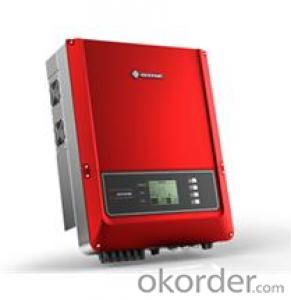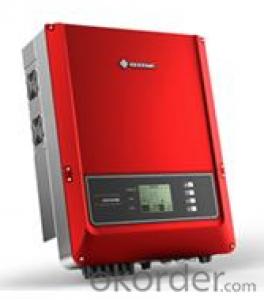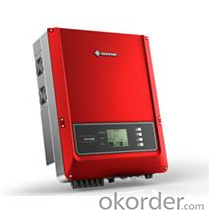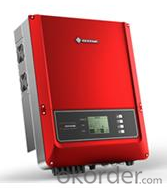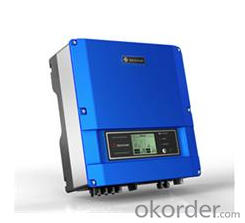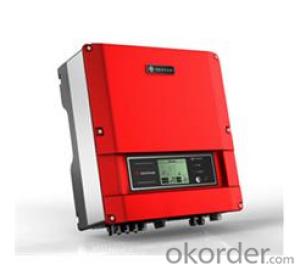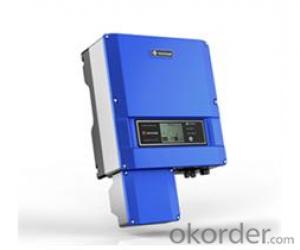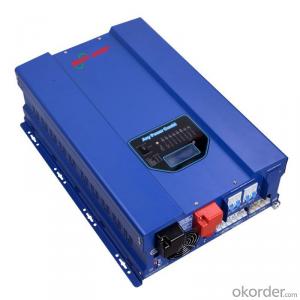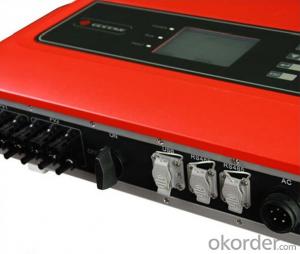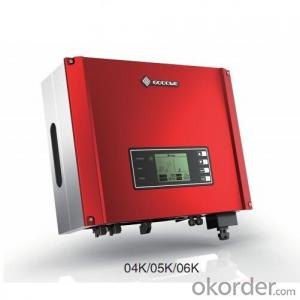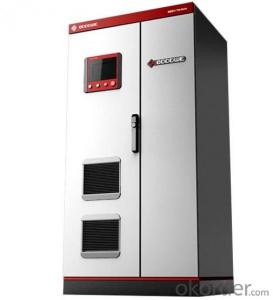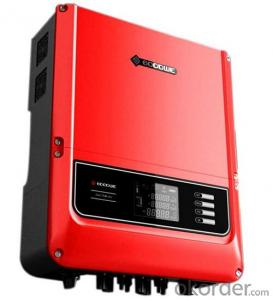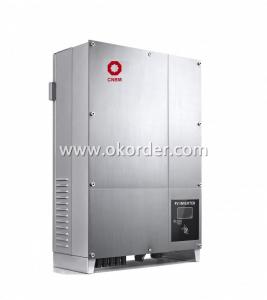5k Solar Inverter GW12K-DT On Grid Solar Inverter
- Loading Port:
- Shanghai
- Payment Terms:
- TT OR LC
- Min Order Qty:
- 10 unit
- Supply Capability:
- 100 unit/month
OKorder Service Pledge
Quality Product, Order Online Tracking, Timely Delivery
OKorder Financial Service
Credit Rating, Credit Services, Credit Purchasing
You Might Also Like
GW12K-DT
GW12K-DT photovoltaic inverter is suitable for commercial and industrial roofs as well as small and medium-sized photovoltaic power systems. Rich communication interfaces make it more convenient for network and monitoring. The use of film capacitor achieves longer service life, more stable system and super-large LCD screen so that we have a commanding view to the run data of the machine.
| DC Input Data | Max.PV-generator power[W] | 12300 |
| Max.DC voltage[V] | 1000 | |
| MPPT voltage range[V] | 500~800 | |
| Turn on DC voltage[V] | 250 | |
Max.DC work current[A] | 22/11 | |
| Number of inputs/MPP trackers | 4/2 | |
| DC connector | SUNCLIX,MC IV (optional) | |
| Standby power consumption [W] | 10 | |
| AC Output Data | Nominal AC power[W] | 12000 |
| Max.AC power[W] | 12000 | |
| Max.output current[A] | 19 | |
| Nominal output voltage range | VDE-AR-N4105,VDE0126-1-1/A1,RD1699,G59/2,AS4777.2/.3 | |
| AC grid frequency | VDE-AR-N4105,VDE0126-1-1/A1,RD1699,G59/2,AS4777.2/.3 | |
| THDi | <1.5%< td=""> | |
| Power factor | 0.90 leading...0.90 lagging | |
| AC connection | 3W/N/PE,230/400V | |
| Efficiency | Max.efficiency | 98.0% |
| European efficiency | 97.5% | |
| MPPT adaptation efficiency | >99.5% | |
| Safty Equipment | Leakage current monitoring unit | Integrated |
| DC switch disconnector | Optional | |
| Islanding protection | AFD | |
| Grid monitoring | VDE-AR-N4105,VDE0126-1-1/A1,RD1699,G59/2,AS4777.2/.3 | |
| Normative Reference | EMC compliance | EN 61000-6-1 , EN61000-6-2, EN 61000-6-3, EN 61000-6-4 |
| Safety compliance | IEC 62109-1, AS3100 | |
| General Data | Dimensions(W*H*D) [mm] | 516*650*203 |
| Net weight [kg] | 39 | |
| Housing | For outdoor and indoor | |
| Mounting information | Wall mounting | |
| Operating temperature range | -20~60℃(up 45℃ derating) | |
| Relative humidity | 0 ~ 95% | |
| Site altitude[m] | 2000 | |
| IP proection class | IP65 | |
| Topology | Transformerless | |
| Cooling | Fan Cooling | |
| Noise level[dB] | <45< td=""> | |
| Display | 5"LCD | |
| Communication | USB2.0;RS485/Wi-Fi/ZigBee(optional) | |
| Standard warranty[years] | 5/10/15/20/25(optional) |
- Q: What is the importance of surge protection in a solar inverter?
- Surge protection is of utmost importance in a solar inverter due to several reasons. Firstly, solar inverters are responsible for converting the direct current (DC) generated by solar panels into alternating current (AC) that can be used to power electrical devices. During this conversion process, there is a potential for power surges or voltage spikes to occur. These surges can damage the sensitive electronic components within the inverter, leading to malfunctions or complete failure. Secondly, solar inverters are often connected to the electrical grid, allowing excess electricity generated by the solar panels to be fed back into the grid. However, the grid can be prone to power fluctuations and surges caused by lightning strikes, utility switching, or other external factors. Without adequate surge protection, these power surges can travel back through the grid and damage the solar inverter. Furthermore, surge protection is essential in safeguarding the entire solar power system. In addition to the solar inverter, there are other components such as charge controllers, battery systems, and monitoring equipment that are interconnected. A surge in any part of the system can potentially damage or disrupt the entire system's operation. By installing surge protection devices, such as surge suppressors or surge arresters, in the solar inverter, the excess energy from power surges is diverted away from the sensitive electronic components. These devices are designed to absorb or redirect the surge, protecting the inverter and other connected equipment. In conclusion, surge protection is crucial in a solar inverter to prevent damage from power surges during the conversion process, protect against external power fluctuations from the grid, and safeguard the entire solar power system. Investing in proper surge protection ensures the longevity and reliable operation of the solar inverter, minimizing the risk of costly repairs or replacements.
- Q: Can a solar inverter be used in regions with high levels of lightning activity?
- Yes, a solar inverter can be used in regions with high levels of lightning activity. However, it is important to install appropriate lightning protection measures to ensure the safety and functionality of the solar inverter system. This can include surge protection devices and grounding systems to mitigate potential damage caused by lightning strikes.
- Q: Can a solar inverter convert DC power to AC power during a power outage?
- No, a solar inverter cannot convert DC power to AC power during a power outage. During a power outage, the solar inverter relies on the grid to function, and without grid power, it cannot convert DC power from the solar panels into usable AC power.
- Q: Can a solar inverter be used in areas with high levels of dust or pollution?
- Yes, solar inverters can be used in areas with high levels of dust or pollution. However, it is important to regularly clean and maintain the inverters to prevent the accumulation of dust or pollutants that could potentially impact their performance or lifespan.
- Q: What is the maximum number of solar panels that a solar inverter can support?
- The maximum number of solar panels that a solar inverter can support depends on the specific model and capacity of the inverter. Different inverters have different power ratings and input capacities, which determine the number of solar panels they can handle. It is important to consult the manufacturer's specifications or consult with a professional to determine the appropriate number of panels that can be supported by a particular solar inverter.
- Q: What is the role of a voltage regulation feature in a solar inverter?
- The role of a voltage regulation feature in a solar inverter is to ensure that the output voltage remains stable and within a specified range, regardless of fluctuations in the input voltage from the solar panels. This feature helps to protect the connected appliances and devices from damage due to overvoltage or undervoltage, and also optimizes the efficiency and performance of the solar inverter system.
- Q: What is the role of maximum power control in a solar inverter?
- The role of maximum power control in a solar inverter is to ensure that the photovoltaic (PV) system operates at its maximum power point (MPP) to optimize energy production. It continuously adjusts the operating voltage and current of the PV panels to maintain the MPP, despite changes in environmental conditions such as temperature and sunlight intensity. This control mechanism maximizes the efficiency and overall performance of the solar inverter, allowing it to extract the highest possible amount of energy from the solar panels.
- Q: How does a solar inverter handle reactive power injection into the grid?
- A solar inverter manages reactive power injection into the grid through the use of power factor control techniques. It adjusts the phase relationship between the voltage and current to ensure that the power factor remains within acceptable limits. This is achieved by either absorbing or injecting reactive power as needed, helping to stabilize the grid and improve overall system efficiency.
- Q: What are the main components of a solar inverter system?
- The main components of a solar inverter system include the solar panels, the inverter itself, a charge controller, batteries (if it is an off-grid system), and the electrical wiring and connections.
- Q: Can a solar inverter be used for both residential and commercial applications?
- Yes, a solar inverter can be used for both residential and commercial applications. Solar inverters are designed to convert the DC electricity generated by solar panels into AC electricity that can be used to power homes or businesses. They can be scaled to accommodate the specific energy needs of residential or commercial properties, making them suitable for various applications.
Send your message to us
5k Solar Inverter GW12K-DT On Grid Solar Inverter
- Loading Port:
- Shanghai
- Payment Terms:
- TT OR LC
- Min Order Qty:
- 10 unit
- Supply Capability:
- 100 unit/month
OKorder Service Pledge
Quality Product, Order Online Tracking, Timely Delivery
OKorder Financial Service
Credit Rating, Credit Services, Credit Purchasing
Similar products
Hot products
Hot Searches
Related keywords
